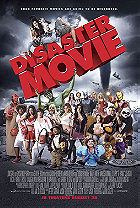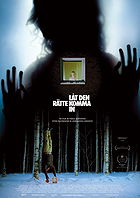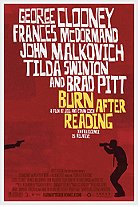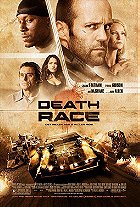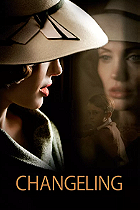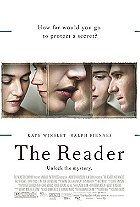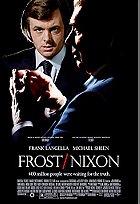Initially conceived by Steven Spielberg over a decade prior to its eventual release, Eagle Eye is a highly derivative action-thriller that combines WarGames, Nick of Time and Enemy of the State. Spielberg was originally attached to direct the movie, but was compelled to surrender the position due to scheduling issues. D.J. Caruso instead took the helm (with Spielberg serving as executive producer), reuniting with star Shia LeBeouf after their collaboration on 2007's Disturbia. Caruso drew inspiration from Alfred Hitchcock for Disturbia, but it appears Caruso doesn't wish to follow in Hitchcock's footsteps after all...with Eagle Eye, it seems he's vying for the title of the next Michael Bay. This is a big-budget, explosive Hollywood blockbuster filled with everything except common sense and believability. Caruso has designed an actioner that discards logic, physics, and reason to generate a nonsensical blur of hyper-stylised explosions and overclocked jabs at tension. An implausible action film beset with the type of visual diarrhoea typically associated with Jerry Bruckheimer and Michael Bay, Eagle Eye is smart in concept but overproduced and absurd in execution. It's certainly entertaining, but be sure to leave your cranial luggage at the door.
The story centres on amiable slacker Jerry Shaw (LeBeouf) and single mother Rachel Holloman (Monaghan). Following the funeral for his recently-deceased twin brother, Jerry discovers his bank account stuffed with thousands of dollars and his little apartment packed with a wealth of terrorist equipment...and federal agents are on their way. Contacting him on his cell phone is a mysterious female voice (an uncredited Julianne Moore) with specific instructions for his escape. With a bang, Jerry is off and running for his life, soon crossing paths with the frightened Rachel as they're guided through a series of perilous situations. The voice on the other end of the phone line can not only control Jerry's phone connection, but seemingly every other piece of technology on the planet as well...
From there, Eagle Eye is one long hyperkinetic chase across the country. The film starts with great promise with its first act introducing plenty of intrigue, passable characterisations and a few pulse-quickening developments. Yet things rapidly crumble as soon as the central plot twist is finally revealed. Once the identity of the female caller is disclosed, Eagle Eye takes a massive nosedive. Needless to say, the actual 'Eagle Eye' of the movie isn't as fearsome or as devious as it should be...it's laughable. The motive is even more unbelievable. Eagle Eye tests a viewer's tolerance for enduring blundering stupidity when the payoff is hardly worth the wait. Director Caruso does an acceptable job of attempting to hide the script's stupidity by keeping the pace fast and furious. In reality, though, the chase sequences are pointless as they never advance the plot - the characters are mice on a treadmill, endlessly running but not getting anywhere. Did Caruso truly think the fast pace would prevent someone from realising the sheer absurdity of the story?
The premise hinges on our advanced world of mobile phones and surveillance cameras, and how this invasion of privacy could be used against us by any force, be it friend or foe. The brain-dead screenplay - stitched together by a quartet of writers - plays on the fears of a post-9/11 society made skittish by the government's increased intrusion into private communications. Jerry & Rachel are pestered by an assortment of mundane technologies, such as electronic billboards and GPS systems, as they're pushed and pulled in various directions while always being closely watched. It's a chilling thought.
Artificial Intelligence is a primary part of the premise as well. However, we've seen movies warning us of the dangers of Artificial Intelligence before, one of which even starred Shia LeBeouf (2004's I, Robot). The plot even seems to borrow countless ideas from Stanley Kubrick's 2001: A Space Odyssey. Perhaps ten years ago when Spielberg conceived the story, the film's message would've been somewhat timely. All these years later, however, it's merely a trite reiteration. It's a shame Spielberg's story was on the backburner for so long.
The key flaw of Eagle Eye (one of several) is not difficult to discern. If an entity has the ability to access and control all networked computers and electronic devices worldwide, why does it need a couple of humans to do its bidding? Furthermore, if it chooses to use them, why send these humans on an unbelievably long and convoluted wild goose chase when the same end could be accomplished more simply? This large issue is impossible to be ignored by anyone who allows a thought to pass through their mind while watching the flick. The word "preposterous" is too moderate to describe Eagle Eye as it contains barely a single mildly plausible moment. For instance, somehow a computer system can remotely disconnect power lines! Ripples in a coffee cup are even monitored in order to listen to a conversation at one stage. The film commences on a ridiculous note as well. For said opening, a spy plane in the Middle East spots a suspected terrorist leader and military computers calculate there's a mere 51% probability it's the guy they're looking for. Instead of waiting for the suspect to head back out into open spaces, they bomb an entire village and kill hundreds of civilians! Eagle Eye is aimed at the brain-dead and the catatonic.
With its contrived message about the dangers of modern technology, Eagle Eye could easily be misinterpreted as an understated, intelligent thriller. Instead, it's an action fiesta. Caruso, who hadn't previously directed a pure action film, feels confident enough here to try a plethora of big-budget stunts. Unfortunately, the Disturbia director isn't interested in breaking new ground - instead he sets up a formulaic game of cat-and-mouse, stealing from the Michael Bay book of blow-'em-ups to lazily engage the audience. Caruso manages to pull off a perfect imitation of a Bay action flick, complete with the irritating, pointless shaky cam technique which wastes potentially interesting stunts by failing to film them correctly. Caruso lacks both the instincts and the subtlety to engage an audience using this technique as he simply shakes the camera for no reason other than to disorient a viewer. Happily, though, a great deal of the stunt sequences were executed with very little CGI. The pace is also brisk and the suspense is admittedly nail-biting, even if the action grows tiresome.
As for the cast, Shia LeBeouf manages to hold his own as the hero at the core of the film. Yet the star continues to play characters within his comfort zone without ever truly testing his limits as an actor. In Eagle Eye, he's the same sort of character we've seen him play in such recent titles as Transformers and Indiana Jones and the Kingdom of the Crystal Skull. How boring. Michelle Monaghan's natural charisma is useful here, but she's predominantly forgettable. There's nothing wrong with her performance in particular...the problem is that she's just playing a bland, standard "girl in a Hollywood thriller" role. Monaghan was much better in the brilliant Kiss Kiss Bang Bang. Billy Bob Thornton and Rosario Dawson appear to be on hand merely to pick up paychecks. It's particularly disappointing to see Thornton in such a thankless role considering his excellent work in recent years (Bad Santa, Monster's Ball, Sling Blade, etc). Michael Chiklis is mildly memorable as the Secretary of Defense, and Anthony Mackie is terrific when thrust into the spotlight for the climax.
Eagle Eye is a big disappointment, taking a topical subject and turning it into action tosh for an action-saturated market. It's comatose and predictable, not to mention it's also a facsimile of nearly every action film from the past decade (right down to a multitude of repetitive, zoom-happy car chases). The film shows all the earmarks of a once substantive script that was endlessly prodded and cut until all intelligence was wrung out of it. It's still possible to see the cautionary message it tries to convey, however - something about the danger of giving computers too much control. But this done-to-death topic has formed the fulcrum of countless sci-fi stories over the years, like the Terminator series, The Matrix, and WALL-E (arguably 2008's best movie). Admittedly, though, the constant action is well staged and somewhat exhilarating, and the whole production is slickly produced. It remains an enjoyable guilty pleasure guaranteed to satiate action fans as it packs quite a wallop. So really, it's not awful - it's just empty-headed.
4.9/10
 Login
Login
 Home
Home 183 Lists
183 Lists 1671 Reviews
1671 Reviews Collections
Collections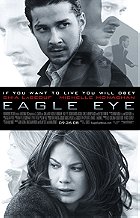
 0 comments,
0 comments, 